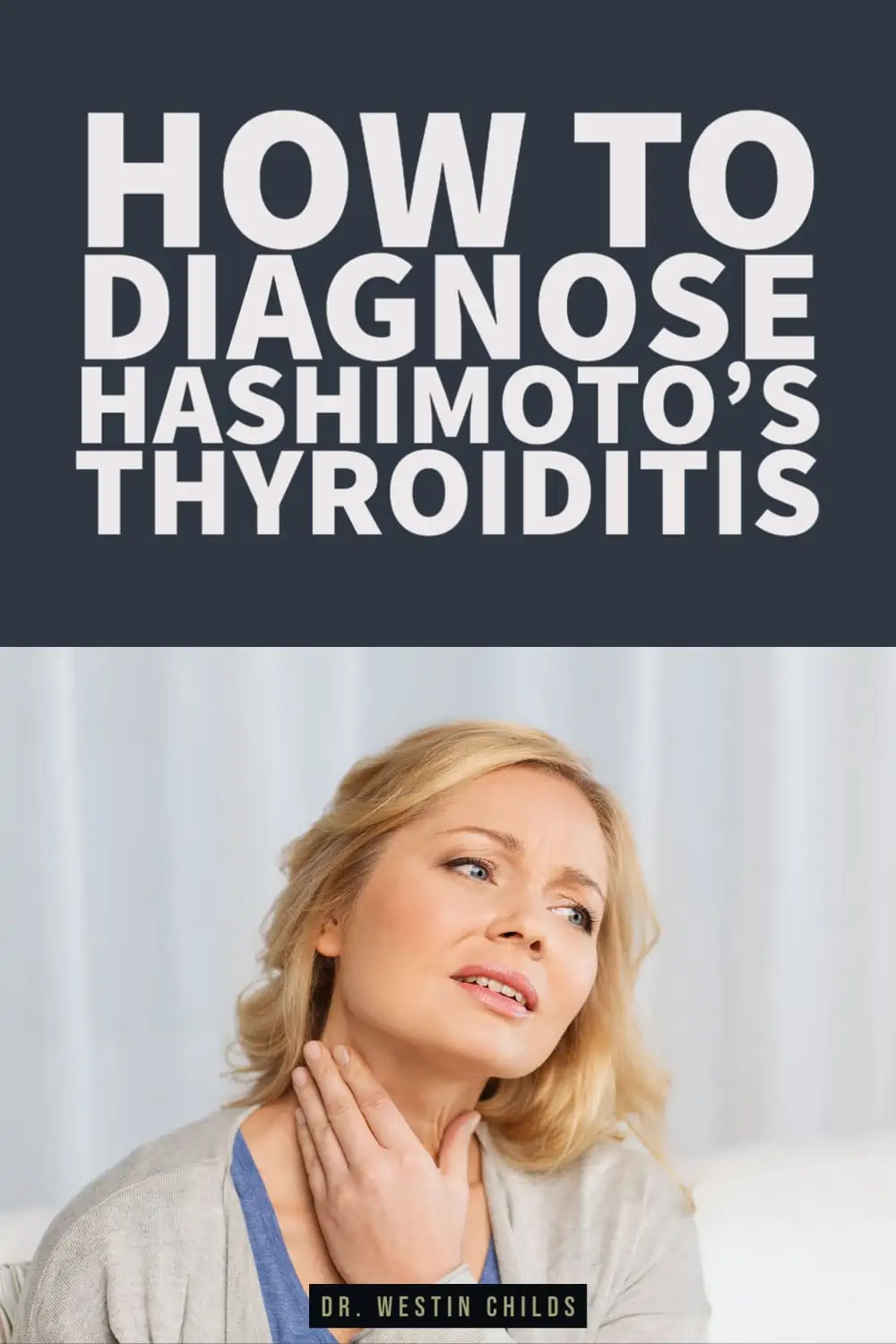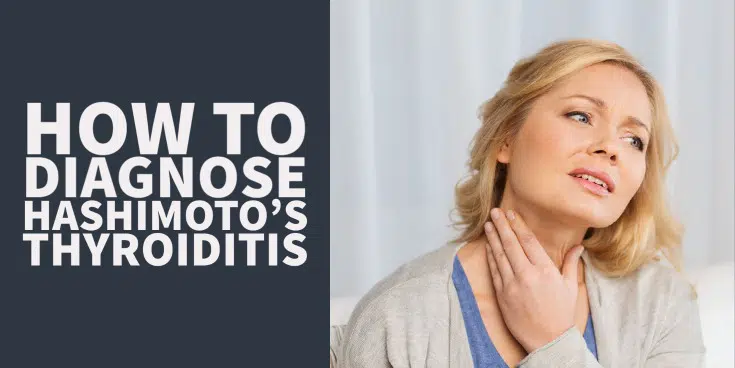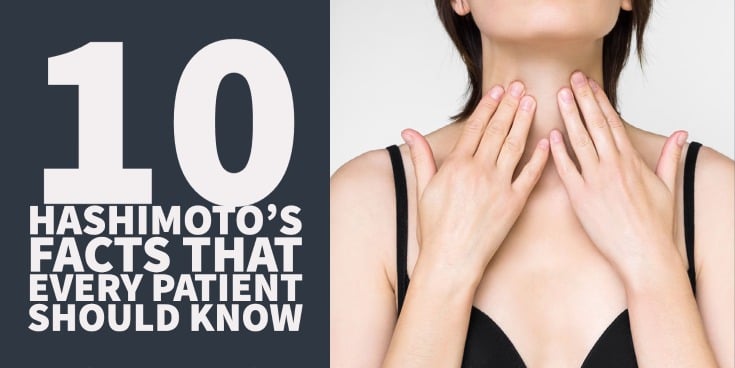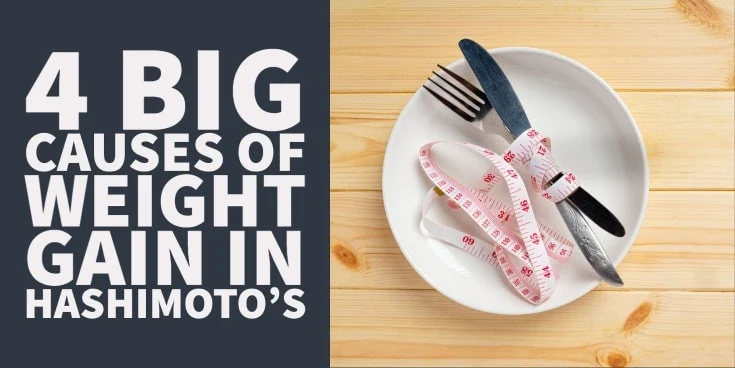If you have or suspect that you have thyroid problems then this article is very important to you.
It turns out that the majority of people who have a thyroid problem have it because of an autoimmune condition.
This condition is often referred to as Hashimoto’s thyroiditis and it is something that EVERY thyroid patient should be aware of (and should be tested for).
This article will walk you through the importance of thyroid antibody testing, how to test for Hashimoto’s, and some basic treatment guidelines.
Why Diagnosing Hashimoto’s Thyroiditis is Important
If you are reading this then you are probably already at least somewhat aware of the disease known as Hashimoto’s thyroiditis.
But for those of you who may not be familiar with it, let’s discuss some of the basics.
Hashimoto’s thyroiditis is an autoimmune disease of the thyroid gland.
As an autoimmune disease, Hashimoto’s results in inflammation and destruction of the thyroid gland which sits at the base of your neck.
It is felt that this inflammation will eventually lead to some permanent destruction of the thyroid gland.
And, because you need your thyroid gland to function, this is a big deal!
As your own body attacks and kills your thyroid gland (this is the hallmark of autoimmune disease), you will start to experience certain symptoms.
These symptoms stem from the fact that your body is not able to keep up with the production of thyroid hormone from your thyroid gland as it is destroyed.
The good news is that diagnosing this problem isn’t all that difficult…
DOWNLOAD FREE RESOURCES
Foods to Avoid if you Have Thyroid Problems:
I’ve found that these 10 foods cause the most problems for thyroid patients. Learn which foods you should avoid if you have thyroid disease of any type.
The Complete List of Thyroid Lab tests:
The list includes optimal ranges, normal ranges, and the complete list of tests you need to diagnose and manage thyroid disease correctly!
How Hashimoto’s Thyroiditis is Diagnosed
Diagnosing Hashimoto’s is VERY important because knowing that you have this disease changes how you should approach treatment.
Run-of-the-mill hypothyroidism is often treated with thyroid hormone replacement.
And while many patients with Hashimoto’s thyroiditis may need thyroid medication at some point, you may be able to catch your disease early and either reverse or halt the progression of your disease.
This means that, for some people, it’s possible to avoid long-term destruction and the need to use thyroid medication for the rest of their life.
The first step to doing this is to find out that you HAVE the disease!
And while this logic may sound obvious to you, it may not be obvious to your physician (the one who typically diagnoses you).
Why?
Because most doctors are conditioned to look only at thyroid gland FUNCTION.
They are trained to treat only when the thyroid gland has been compromised enough to result in certain symptoms in the body (such as hair loss, fatigue, weight gain, and cold intolerance).
Furthermore, most doctors do not feel that the diagnosis of Hashimoto’s is even necessary or helpful because it doesn’t change how they plan to treat you.
The conventional thought process is to “wait and see” (1) while your own body attacks and destroys your thyroid gland until you eventually need thyroid hormone medication.
If this doesn’t sit well with you, you are not alone!
The entire goal of this article is to help you understand how you can easily and quickly diagnose this disease so that you can take ACTION.
There are 3-4 main ways that Hashimoto’s thyroiditis is diagnosed (2), but you don’t necessarily have to go through all of them to get your diagnosis.
Some of the tests we are about to talk about are easy to get and others may require more invasive procedures.
Don’t let any of this scare you, however, because most doctors feel comfortable making the diagnosis if you have a positive test in any of the three areas.
This means that you do NOT necessarily have to get ALL of the tests done!
In many cases, it’s possible to make the diagnosis if you have the symptoms of hypothyroidism, abnormal thyroid lab tests, and positive antibodies.
#1. Lab Testing for Antibodies
No test in medicine is ever perfect.
It’s possible that you can test positive for some test but not actually have the disease that it purports to test for.
I know this may seem confusing, but it isn’t if you consider that all tests have false positives and false negatives.
False positives are tests that test for a specific condition or disease and in which the test is positive but the patient doesn’t actually have the disease.
False negatives are tests that test for a specific condition or disease and in which the person tests negative but actually has the disease.
The reason I am bringing this up here is that you must realize that even though we are talking about testing for a specific condition, not all of these tests are 100% accurate.

With that out of the way, the easiest way to test for Hashimoto’s thyroiditis is by looking specifically for antibody levels in the bloodstream.
We already know that Hashimoto’s stems from an autoimmune attack on the body.
And it turns out that you can test directly for these antibodies to see if they exist in your bloodstream (3).
If you have a positive antibody level, there is a very high chance that you are suffering from Hashimoto’s thyroiditis.
But, as I said earlier, just because you have positive antibodies does not 100% mean that you have Hashimoto’s.
However, I feel, and a great many other people feel as well, that if you have the symptoms of hypothyroidism AND elevated thyroid antibodies, AND abnormal thyroid lab tests, then you can safely diagnose that person with Hashimoto’s.
But the real world isn’t that clear-cut.
Sometimes people have the symptoms of hypothyroidism with elevated antibodies but normal thyroid lab tests (4).
Does this mean these people don’t have Hashimoto’s? Not at all.
In fact, a great many people with early Hashimoto’s present with this exact combination.
Other people have absolutely zero symptoms of hypothyroidism but elevated antibodies.
Does this mean these people don’t have Hashimoto’s? Not necessarily, it’s possible that this person may progress to Hashimoto’s and hypothyroidism at some point in their life.
In either event, it’s absolutely critical that you TEST for these antibodies AND put them into context with your personal history, other lab tests, and how you are feeling.
I believe that you can diagnose Hashimoto’s, with a high degree of certainty, in individuals who have BOTH the symptoms of hypothyroidism and slightly elevated antibodies.
The antibodies that you want to look for include:
- Thyroid Peroxidase Antibodies (Abbreviated TPO antibodies)
- Thyroglobulin Antibodies (Abbreviated TgAb on some lab tests)
#2. Lab Testing for Thyroid Function
In addition to testing directly for thyroid antibodies, you can also test how well your thyroid gland is actually functioning.
This can be done with blood tests so this is a non-invasive test that is quick and easy to get.
Thyroid lab testing, while important, is not the MOST important test if you have Hashimoto’s.
The reason for this is simple:
It appears that thyroid function lab tests lag behind the development and progression of Hashimoto’s in a large percentage of patients.
What does this mean?
It means that many people with Hashimoto’s thyroiditis are walking around with normal thyroid lab tests even though they technically have Hashimoto’s.
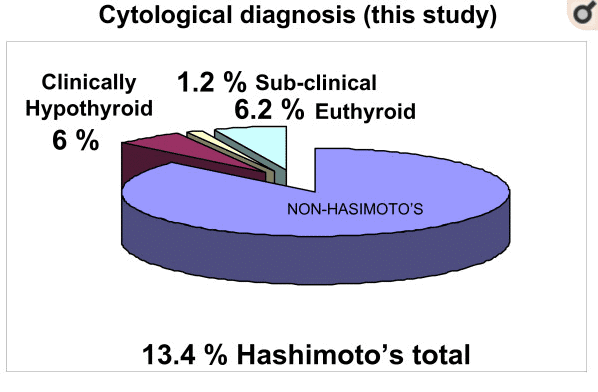
Newer studies have shown that there appears to be a pre-clinical stage of Hashimoto’s thyroiditis (5) which can be seen only with a biopsy. And this state is not uncommon either.
People at this stage of their disease often have normal thyroid lab tests but will eventually progress to develop full-blown hypothyroidism from their Hashimoto’s at some point in the future.
So while some patients with Hashimoto’s may have relatively normal thyroid lab tests, some patients have overtly hypothyroid lab tests as well.
Those people who have overtly hypothyroid lab tests are rarely ever missed by the doctor because the connection between your symptoms and your lab tests is often quite clear.
If you have the symptoms of weight gain, fatigue, and hair loss AND your TSH is greater than 5.0 then the diagnosis is a no-brainer.
But the diagnosis can become more difficult to make if your TSH (and other thyroid hormone levels) are in the “normal” range.
Despite the potential drawbacks of thyroid function testing, it should still be done in ALL thyroid patients, including those with Hashimoto’s thyroiditis.
And I typically recommend you test for both your antibodies and your thyroid function at the same time.
#3. Ultrasound Testing
Another non-invasive way to test for Hashimoto’s is with the use of ultrasound imaging.
Ultrasound only requires the use of an ultrasound wand which is placed over the skin.
From there, sound waves can provide an image of the thyroid gland which is projected onto a screen.
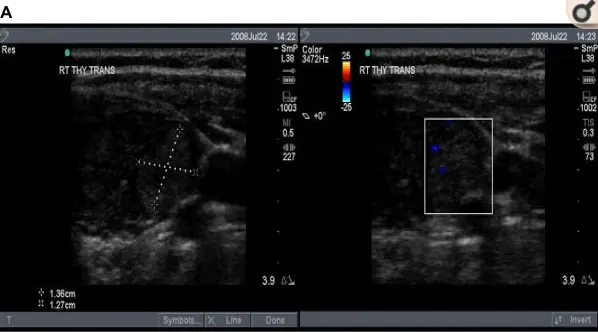
A radiologist can look at the features of your thyroid gland and determine a lot about it including whether inflammation is present, the size of the gland, how many nodules or lesions are present, whether they look cancerious, and so on.
The presence, or absence, of these features, can help shed light on what is happening to your thyroid gland and can be very helpful in certain cases.
The only downside to ultrasound testing is that it isn’t very specific.
Ultrasound can tell you if there is inflammation present, but it can’t tell you where that inflammation is coming from.
So using ultrasound testing is often best when it is in combination with other tests such as your thyroid lab tests.
Reading an ultrasound report can be confusing for a patient, but there are some basics that you can take away from your report.
If you read in your report that your thyroid looks ‘homogenously hypoechoic’ or ‘peripherally hypoechoic’ then there is a relatively high chance that you have Hashimoto’s.
Studies show that people with these patterns are found in 45.2% and 40.3% (6) (respectively) of patients with Hashimoto’s thyroiditis.
#4. Biopsy
Finally, the last way to test for Hashimoto’s is with a direct biopsy of the thyroid gland.
A biopsy is the most invasive of all of the tests that I’ve listed so far but it also happens to be the most accurate.
But just because it’s the most accurate does not mean that you need to run around poking a needle into everyone’s thyroid gland to diagnose them.
Instead, it’s far better to use the other tests listed above, in concert with each other and with your symptoms, to get to the diagnosis.
In some instances, however, you may actually need a biopsy (such as when you have a large thyroid nodule or if your doctor suspects thyroid cancer).
A biopsy allows doctors to stain your thyroid gland tissue and evaluate it under a microscope.
When they do this, they are looking at something like this image:
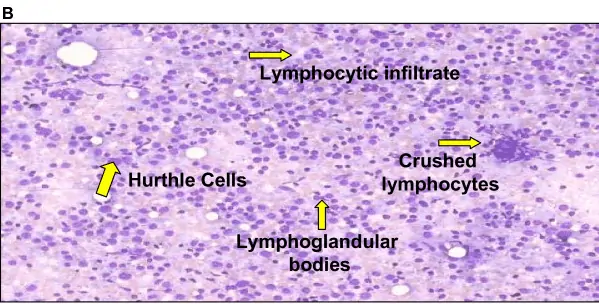
Your doctor will be looking for certain signs of Hashimoto’s including the infiltration of certain white blood cells into your thyroid gland (7) which indicate inflammation and damage.
Antibodies During Pregnancy
We’ve spent this whole time talking about diagnosing Hashimoto’s and I want to just spend one minute talking specifically about pregnancy.
I told you earlier that there are some conditions where your thyroid antibodies could be elevated but that doesn’t mean that you have Hashimoto’s.
Well, pregnancy is one of those conditions.
It turns out that some pregnant women will experience elevated thyroid antibodies during pregnancy (8) and it doesn’t mean that these women necessarily have thyroid disease.
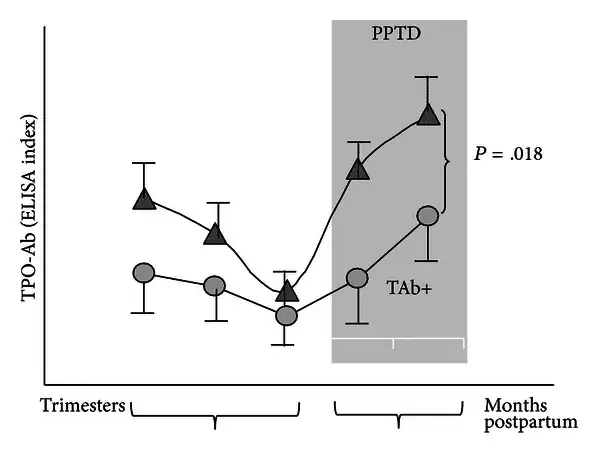
Now some of them may very well have it, but there are plenty of women who experience only a transient (short-term) elevation in thyroid antibodies which do go away after delivery.
Some women, however, may experience a further increase in antibodies in the post-partum period and they may go on to develop post-partum thyroiditis which is a Hashimoto’s like condition which is usually temporary.
We do know, however, that these antibodies are NOT healthy for either the mother or the fetus, even in the absence of thyroid disease.
These antibodies can cross the placenta and may cause issues for your child. In addition, the mere presence of thyroid antibodies does increase your lifetime risk of developing thyroid disease at some point in the future and may also increase your risk for certain cancers (9).
If you have Hashimoto’s it may be helpful to test your antibodies at various stages during pregnancy to track them.
Many women, who have Hashimoto’s prior to pregnancy, may see a decline in their antibodies during the actual pregnancy only to find an increase in the post-partum period.
This information can be very helpful and can guide your treatment!
Treatment
If you have elevated antibodies in your body you may be wondering if it’s possible to lower them.
And the answer is yes.
I’ve written about how to do this in other articles, but I will also provide a quick recap of some of the therapies that may help you reduce your antibodies below:
- Change your diet – Certain food groups can worsen immune function and may increase your risk of developing autoimmune disease. Eliminating these foods may help improve your condition.
- Test your testosterone and androgens – Women (and men) with autoimmune diseases tend to have low levels of testosterone (10). Replacing this testosterone with bio-identical hormone may improve your immune system.
- Look for the right nutrients – Certain nutrients, such as Selenium, have been shown to reduce inflammation and may help reduce thyroid antibodies (11). Other nutrients, such as Vitamin D, also play an important role in regulating the immune system.
- Improve your gastrointestinal tract (12) – Your gastrointestinal tract may be the source of inflammation in your body. By addressing gut integrity you may be able to improve your immune function.
- Look at using low-dose naltrexone (LDN for short) – LDN is a prescription medication that has been shown to balance the immune system and some people who use it to treat Hashimoto’s report feeling much better.
Many of these therapies are things that YOU can do by yourself starting today.
If you have Hashimoto’s, or even if you suspect it, you should do all that you can to learn more about those therapies.
Conclusion
Testing for Hashimoto’s does not have to be difficult and it is something that every patient with known thyroid disease should undergo.
Simple tests such as looking at your thyroid function and checking to see if you have elevated thyroid antibodies should be your first step.
This information is usually enough to diagnose the presence of Hashimoto’s in the vast majority of individuals.
If there is any question after you get these tests then you can look at the more advanced tests such as ultrasound and biopsy.
Once you have the diagnosis nailed down your next step is to undergo treatment!
Don’t just stop at diagnosis, because you can potentially make an impact on your disease and slow down the eventual progression to hypothyroidism or thyroid gland atrophy.
Now I want to hear from you:
Do you have Hashimoto’s?
Do you suspect you have Hashimoto’s?
Which tests have been helpful in your diagnosis?
Are you struggling to get your doctor to order the right tests?
Leave your questions or comments below!
